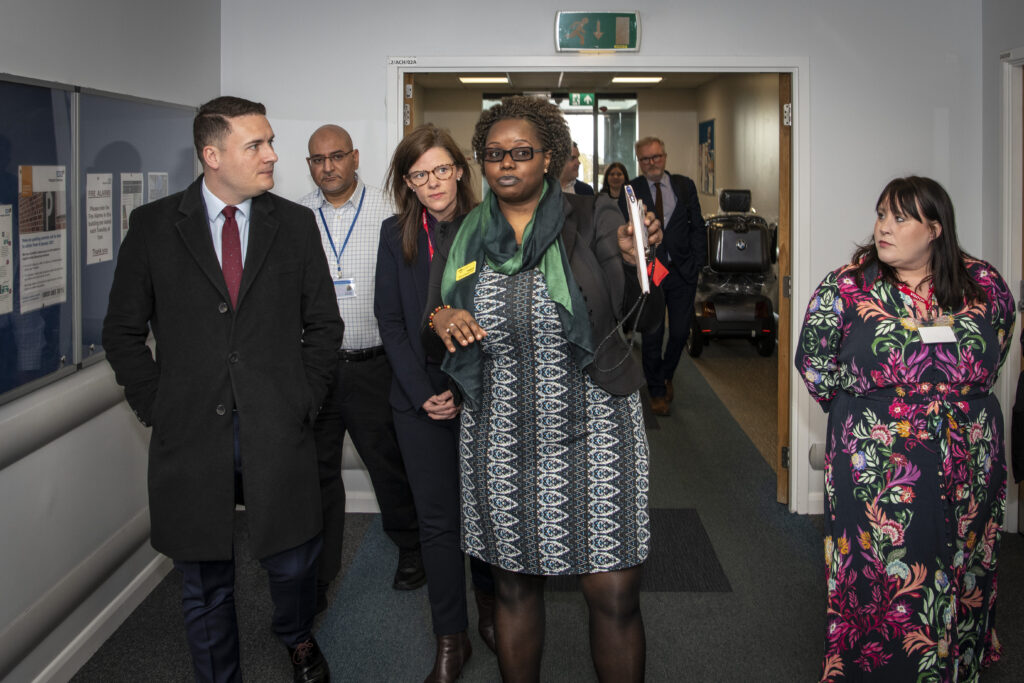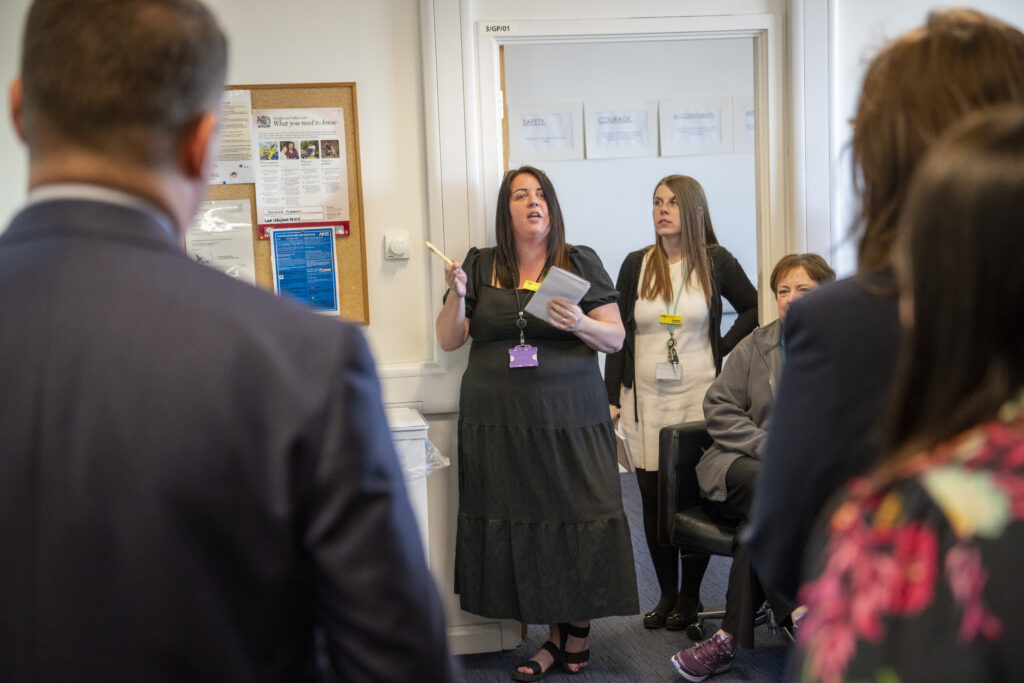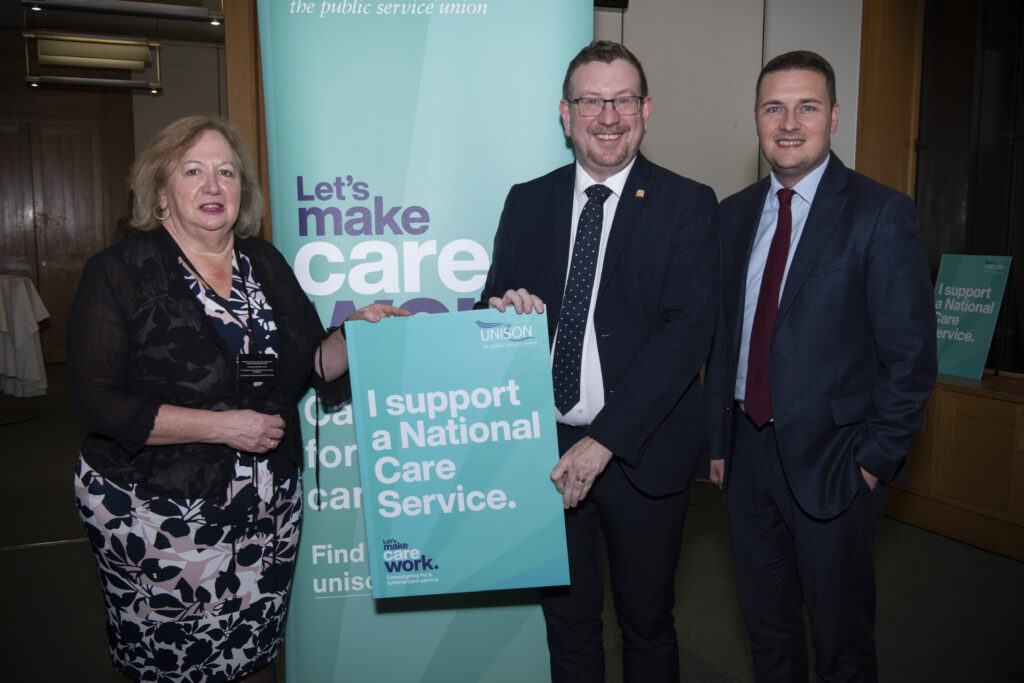Lead image: Steve Forrest/Workers’ Photos
For someone who wants to move out as soon as possible, Wes Streeting MP must have the one of the best offices going. Sitting down for an interview on the corner of Portcullis House there’s no need for a clock, it’s Big Ben out of one window and The London Eye out of the other. But I’m sure he’d rather be down the road in the Department of Health.
Labour’s hope to take over in charge of the NHS and social care sector in England was born in London, schooled in Westminster and read history at Cambridge. You could be forgiven, on first impressions, for thinking ‘oh great, another one’.
But the shadow health and social care minister doesn’t have your typical political background.
“I’m not sure there are many, if any, MPs in Parliament whose grandparents spent time in prison,” he says, “or whose mum was born while their nan was on release, handcuffed to a hospital bed.”
He grew up in poverty living in a council flat in Stepney, East London, and is a product of what he calls “two different, but stereotypical, East End families.”
On his dad’s side, a traditional working-class East End Tory family. While on his mum’s side, he says: “the tragedy of my nan spending time in prison is that I think she could have been an extraordinary Labour councillor, or even MP.”
Contrary to what the name suggests, Westminster City School was a comprehensive and he says: “The reason I’m speaking to you today, sat here in Westminster as an MP rather than serving time behind bars like my grandad, is because I had a great state education.
“My whole driving conviction in politics is making sure that people, particularly kids from working class backgrounds like mine, have the same choices, chances and security in life as people from wealthier backgrounds.”
Defending the NHS
He took up his current role in November 2021, and was “over the moon”, for two reasons. The first, he says, is that he owes his life to the NHS.
“When I was diagnosed with kidney cancer at the age of 38 [three years ago], it was an enormous shock. I was very lucky that my cancer was diagnosed early and treated fast. But because of the Labour values built into the NHS, while I had so many worries going through my mind, the one thing I didn’t have to worry about was the bill.
“To my dying day, I will always defend the NHS as a public service, free at the point of use.”
The second reason is that, for Wes, “seeing the NHS in the state that it’s in today breaks my heart. How have we got to the stage where the NHS isn’t there for people when they need it?
“I think there is an absolute moral obligation resting on the Labour Party, to make sure that not only do we rescue the NHS from the worst crisis in its history, but we make sure it’s fit for the future.”

Wes visiting the Cambridge Practice GP in Aldershot – Steve Forrest/Workers’ Photos
A decade of national renewal
With waiting lists at an all-time high, patient satisfaction an all-time low, staff coming under massive workload pressures and the NHS struggling to fill vacancies, the challenges in the sector are huge and wide ranging.
How will he deal with it? “It starts with honesty about the scale of the challenge and how long it’s going to take,” he says. “If we’ve got a realistic plan, then I think the public will give us permission to govern.
“Then, staff and patients will begin to feel those improvements and give us permission to finish the job with the decade of national renewal which our country needs.”
The first stage in that process involves his plan for bringing down waiting lists and, to do that, he has committed to delivering two million more appointments a year through extra evening and weekend working in the NHS. “And to make it happen we’re going to put £1.1bn directly into the pockets of NHS staff.”
He also wants to avoid strike action by “having much more respectful, collaborative relationships” with unions. And he wants to increase diagnostic capacity by doubling the number of scanners and use “AI-enabled scanners” in the service as “a huge chunk of waiting lists are people waiting for tests and scans.”
Privatisation: ‘Over my dead body’
His critics would claim he is in favour of privatisation but, according to him: “Nothing makes my blood boil more than people saying I want to privatise the NHS. Over my dead body would we privatise the NHS. What I have said is that we would use spare private sector capacity to bring down the NHS waiting list faster, making sure that patients never have to worry about the bill, and at the same time we will be building capacity within the NHS.”
For him, it’s a practical argument – he wants people diagnosed faster – but also a principle and class issue: “Why should those who can afford it get seen faster, and those who can’t get left behind?”

Wes speaks to back-room staff at the Cambridge Practice – Steve Forrest/ Workers’ Photos
Workforce in an improving NHS
Turning to the workforce, he says: “The NHS is a team effort. Whether it’s the staff managing the waiting lists, the people who are making sure the operating theatre is clean, whether it’s the porters getting us from A to B – every single one of those people is involved in saving people lives. Every one of them deserves to be treated with respect and feel valued. [Music to the ears of those working on UNISON’s One Team campaign…]
“I think on pay and conditions, staff, particularly lower paid staff, are right to be angry about the way they’ve been treated. And I’m more worried about the NHS staff who are lying awake at night, worried about how to pay their bills. Which is why I’ll be asking higher paid staff to bear with us while we get the economy back on track.”
He also talks about the need for proper workforce planning – good pay, career progression and development opportunities. “I don’t think people are expecting a Labour government to come in and be able to solve everything overnight. But I want people to feel like they’re working in an improving NHS. I think that will go a long way to keeping the staff we already have.”
Funding and reform
To build a ‘modern service’, he regularly talks about how funding and reform must be linked together.
“I think the problem with the word [reform] is that people immediately think back to Andrew Lansley [several Tory health secretaries ago] and the disastrous top-down reorganisation that nobody wanted, nobody voted for and cost us billions of pounds. I can assure people that’s not what we’re going to do – that’s not what the NHS needs.
“But NHS staff are crying out for change. They’re the ones telling me about creaking IT systems, they’re the ones going home at the end of the day, deeply frustrated because they’ve done their best, and they feel their best wasn’t good enough.
“I always say that the lesson of the last Labour government is that it was investment and reform which delivered the shortest waiting times and the highest patient satisfaction ever.”
On the topic of investment and funding, he says: “We’re not naïve about the financial challenges. Labour hasn’t made lots of big spending commitments, because of the state of the public finances. And we also know that, if there’s one thing in even shorter supply than money at the moment, it’s trust in politics and politicians.
“So, we’ve got to make promises we know we can keep and deliver. But if you look at Rachel Reeves, our shadow chancellor, she has made significant commitments on the NHS and I think that tells you something about a Labour government’s priorities around health and social care.”

Christina McAnea, Andrew Gwynne MP and Wes Streeting MP at the parliamentary launch of UNISON’s make care work pledge campaign – Marcus Rose
Making care work
Wes has his own flagship commitment. “I’ve asked every Labour MP to sign UNISON’s pledge calling for a national care service [in England] because I think that’s the level of ambition that we need in the country.”
Outlining the scale of that ambition, he has said, “We’ve got to do for care in the 21st century, what we did for health in the 20th century.”
He gives two reasons: “Without fixing social care, we can’t fix the crisis in the NHS. But I also feel so strongly about the fact that social care is important in and of itself. I want lives lived to the full, to the very end.”
He also highlights that disabled people are regularly overlooked in the social care conversation, saying with the right support, in and out of work, “people can have a great quality of life that any of us would aspire to. But, often they feel like they’re having to battle and fight for everything, on top of coping with their disability.”
‘Just’ care workers
On care worker pay, he continues: “These are care professionals. It’s hard work and we’ve got some brilliant people in there that are not being valued enough. I can’t tell you how many times I’ve been in roundtables and people say, ‘Oh I’m the director of so and so’, or ‘I’m the chief exec of this’. And then you get round to the UNISON member who says: ‘I’m just a care worker.’ And I think ‘just a care worker? You’re the most important person around the table.’
“I’m really proud of Labour’s historic commitment to deliver the first ever fair pay agreement for social care staff. And we’re going to go further than that. What I want is a proper career structure and for care staff to be respected as a profession. I really hope that after a Labour government driving the change we need in social care, that no-one will ever again say they’re ‘just a care worker’ and we will value and appreciate care professionals in the same way that people, rightly, lionise NHS staff.”

Wes listening to ‘just care workers’ at a Fabian Society event on the roadmap to a national care service held at UNISON centre in February 2024 – Marcus Rose
2024: Year of LGBT+
Wes is also one of the UK’s highest profile LGBT+ politicians and, speaking about UNISON’s year of LGBT+ workers he says: “I know what it’s like to experience homophobic bullying in the workplace – I’ve experienced it in the past. It’s deeply unpleasant.
“For trans people, I think this has been a particularly frightening time. I think so much of the conversation about trans rights and identities has become toxic and I’ve seen that toxicity in public life work both ways. We’ve got to get this right. I want everyone to feel safe and included and I’ve tried to play my part in building a much better conversation around LGBTQ+ equality.”
Doing, not just talking
If Labour does win the next general election, and Wes becomes secretary of state for health and social care, he will be in charge of the sectors within England, but each of the devolved administrations are in charge of their own health policy.
He talks of maintaining close relationships in Scotland with the Labour deputy leader there, Jackie Bailey, as well as with Eluned Morgan, Labour’s health minister in Wales. “I think there are massive opportunities for governments across the UK with a Labour government in Westminster. If we get things right in England, we’ll create a rising tide that lifts all ships.”
Cynics would say it’s easy to listen and to promise in opposition, but it’s harder and matters more when you’re in power.
For Wes: “As I said to the UNISON ambulance workers I met yesterday – you can expect to see me around if I’m the next health and social care secretary. Whether at parliament or whether I’m out on visits at ambulance stations, talking to nurses on the frontline, or shadowing community teams or care staff.
“UNISON has a really important voice at the table [in Labour politics] and I’m really excited about the possibility of being able to work with UNISON members to solve the problems rather than to just campaign on them.”
Email your MP today to ask them to pledge to build a national care service:
And watch Wes talk about what national care service means to him:







